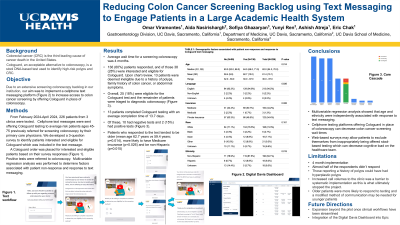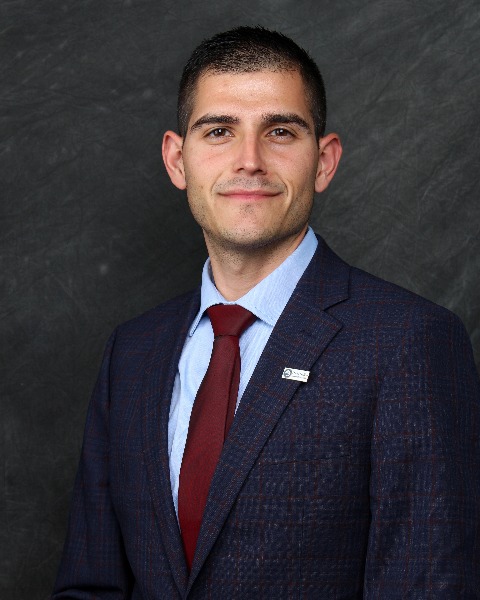Tuesday Poster Session
Category: Colorectal Cancer Prevention
P3815 - Reducing Colon Cancer Screening Backlog Using Text Messaging to Engage Patients in a Large Academic Health System
Tuesday, October 29, 2024
10:30 AM - 4:00 PM ET
Location: Exhibit Hall E

Has Audio

Omar Viramontes, MD
University of California Davis Health
Sacramento, CA
Presenting Author(s)
Omar Viramontes, MD1, Aida Nasirishargh, MD2, Sofiya Ghazaryan, BS2, Yunyi Ren, MS2, Ashish Atreja, MD2, Eric Chak, MD2
1University of California Davis Health Graduate Medical Education, Sacramento, CA; 2University of California Davis Health, Sacramento, CA
Introduction: Colorectal cancer (CRC) is the third leading cause of cancer death in the United States. Cologuard, an acceptable alternative to colonoscopy, is a stool DNA-based test used to identify high-risk polyps and CRC. Due to an extensive screening colonoscopy backlog, our aim was to implement a cellphone text messaging platform to increase access to colon cancer screening by offering Cologuard in place of colonoscopy.
Methods: Cellphone text messages were sent offering Cologuard testing to average risk patients ages 45-75 previously referred for screening colonoscopy by their primary care physicians. Clinical and information technology stakeholders designed and implemented the platform. We developed a 3-question survey to identify patients interested and eligible for Cologuard which was included in the text message. A Cologuard order was placed for interested and eligible patients based on their survey responses. Positive tests were referred to colonoscopy. Multivariable regression analysis was performed to determine factors associated with patient non-response and response to text messaging.
Results: The average wait time for a screening colonoscopy was 4 months. From February 2024-May 2024, 226 patients were texted. 136 (60%) patients responded, and of those 38 (28%) were interested and eligible for Cologuard. Upon chart review, 13 patients were deemed ineligible due to a history of polyps, family history of colon cancer, or abdominal symptoms. Overall, 25 (18%) were eligible for the Cologuard test and the remainder of patients were triaged to diagnostic colonoscopy. 13 patients completed Cologuard testing with an average completion time of 13.7 days. Of these, 10 had negative tests and 2 (15%) had positive tests (Figure 1). Patients who responded to the text tended to be older (mean age 62.7 years vs 59.4 years; p=0.014), more likely to have Medicare insurance (p=0.026) and be non-Hispanic (p=0.015) (Table 1). Multivariable regression analysis showed that age and ethnicity were independently associated with response to text messaging.
Discussion: Dedicated cellphone texting platforms offering Cologuard in place of colonoscopy can decrease colon cancer screening wait times and web-based surveys may allow patients to exclude themselves from inappropriately being offered stool-based testing which can decrease cognitive load on the healthcare team. Older, non-Hispanic, Medicare-insured patients were more likely to respond to these text messages.

Note: The table for this abstract can be viewed in the ePoster Gallery section of the ACG 2024 ePoster Site or in The American Journal of Gastroenterology's abstract supplement issue, both of which will be available starting October 27, 2024.
Disclosures:
Omar Viramontes, MD1, Aida Nasirishargh, MD2, Sofiya Ghazaryan, BS2, Yunyi Ren, MS2, Ashish Atreja, MD2, Eric Chak, MD2. P3815 - Reducing Colon Cancer Screening Backlog Using Text Messaging to Engage Patients in a Large Academic Health System, ACG 2024 Annual Scientific Meeting Abstracts. Philadelphia, PA: American College of Gastroenterology.
1University of California Davis Health Graduate Medical Education, Sacramento, CA; 2University of California Davis Health, Sacramento, CA
Introduction: Colorectal cancer (CRC) is the third leading cause of cancer death in the United States. Cologuard, an acceptable alternative to colonoscopy, is a stool DNA-based test used to identify high-risk polyps and CRC. Due to an extensive screening colonoscopy backlog, our aim was to implement a cellphone text messaging platform to increase access to colon cancer screening by offering Cologuard in place of colonoscopy.
Methods: Cellphone text messages were sent offering Cologuard testing to average risk patients ages 45-75 previously referred for screening colonoscopy by their primary care physicians. Clinical and information technology stakeholders designed and implemented the platform. We developed a 3-question survey to identify patients interested and eligible for Cologuard which was included in the text message. A Cologuard order was placed for interested and eligible patients based on their survey responses. Positive tests were referred to colonoscopy. Multivariable regression analysis was performed to determine factors associated with patient non-response and response to text messaging.
Results: The average wait time for a screening colonoscopy was 4 months. From February 2024-May 2024, 226 patients were texted. 136 (60%) patients responded, and of those 38 (28%) were interested and eligible for Cologuard. Upon chart review, 13 patients were deemed ineligible due to a history of polyps, family history of colon cancer, or abdominal symptoms. Overall, 25 (18%) were eligible for the Cologuard test and the remainder of patients were triaged to diagnostic colonoscopy. 13 patients completed Cologuard testing with an average completion time of 13.7 days. Of these, 10 had negative tests and 2 (15%) had positive tests (Figure 1). Patients who responded to the text tended to be older (mean age 62.7 years vs 59.4 years; p=0.014), more likely to have Medicare insurance (p=0.026) and be non-Hispanic (p=0.015) (Table 1). Multivariable regression analysis showed that age and ethnicity were independently associated with response to text messaging.
Discussion: Dedicated cellphone texting platforms offering Cologuard in place of colonoscopy can decrease colon cancer screening wait times and web-based surveys may allow patients to exclude themselves from inappropriately being offered stool-based testing which can decrease cognitive load on the healthcare team. Older, non-Hispanic, Medicare-insured patients were more likely to respond to these text messages.

Figure: Figure 1. Care Cascade
Note: The table for this abstract can be viewed in the ePoster Gallery section of the ACG 2024 ePoster Site or in The American Journal of Gastroenterology's abstract supplement issue, both of which will be available starting October 27, 2024.
Disclosures:
Omar Viramontes indicated no relevant financial relationships.
Aida Nasirishargh indicated no relevant financial relationships.
Sofiya Ghazaryan indicated no relevant financial relationships.
Yunyi Ren indicated no relevant financial relationships.
Ashish Atreja: Astrazeneca – Consultant. Commure – Stock-privately held company. GlobalventuresX – I have investments in GlobalVenturesX venture studio and its portfolio companies, Stock-privately held company. Livecare USA – Speakers Bureau, Stock-privately held company. Novo Nordisk – Advisory Committee/Board Member.
Eric Chak indicated no relevant financial relationships.
Omar Viramontes, MD1, Aida Nasirishargh, MD2, Sofiya Ghazaryan, BS2, Yunyi Ren, MS2, Ashish Atreja, MD2, Eric Chak, MD2. P3815 - Reducing Colon Cancer Screening Backlog Using Text Messaging to Engage Patients in a Large Academic Health System, ACG 2024 Annual Scientific Meeting Abstracts. Philadelphia, PA: American College of Gastroenterology.
